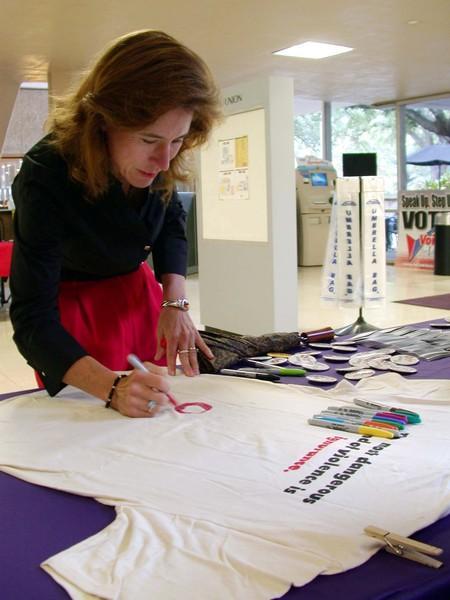“To all survivors — we support you and care about you. Youare not alone.”
“Remember my name — all the women who died due toviolence.”
“Forgiveness is hard. I miss you!”
These are some of the emotions survivors of sexual assault andviolence and victims’ friends and family members expressed throughart by painting T-shirts at the Women’s Center last Tuesday. Theartwork is part of the Clothesline Project, a national projectdedicated to raising awareness of violence against women.
The T-shirts voicing the women’s sides of their stories were ondisplay Thursday in the Union, where the T-shirts were hanging on aclothesline for all of campus to view.
The Clothesline Project provides an opportunity for survivors,family members and friends of victims of violence to write words,feelings and pictures at the display, said Autumn Douglas, adietician at the Student Health Center and coordinator for theClothesline Project.
The colors of paint symbolize different types of abuse. Pinksymbolizes sexual assault, white stands for interpersonal violence,yellow memorializes people who have been battered or physicallyabused, purple represents people attacked due to their sexualorientation and blue stands for survivors of incest or child sexualabuse, Douglas said.
The project gives people who suffered from violence an outlet tomake the issue of violence personal for everyone who sees theclothesline, Douglas said.
While this is the first year the University has participated inthe Clothesline Project, it is a national program that began in1990, according to the national Clothesline Project Web site. It isdedicated to addressing the issue of violence against women, andallows survivors of sexual assault and violence and victims’ familyand friends to express their emotions by decorating a shirt. Theshirts hang on a clothesline to make others aware of the problem ofviolence against women, according to the Web site.
Carol A. Chichetto of East Dennis, Mass., chair of the project’ssteering committee, told the National Organization for Women thatdoing the laundry always has been considered women’s work, and inthe days of close-knit neighborhoods, women often exchangedinformation over backyard fences while hanging their clothes out todry.
“The concept was simple — let each woman tell her own story, inher own unique way, and hang it out for all to see,” Chichetto toldNOW. “It was and is a way of airing society’s dirty laundry.”
Douglas said the Wellness Center also is coordinating otherprograms related to violence on campus.
The Center passed out 10,000 cards promoting “Get Carded 2004,”a national toll-free sexual assault hotline. The cards have tips onhow to reduce the risk of sexual assault and what to do if sexuallyassaulted, Douglas said. The card also includes tips for men whohave been sexually assaulted.
“We have had a good response with people giving out cards,”Douglas said. “We have given them to residential halls and havegiven some to professors to hand out in class.”
I’m a survivor
September 24, 2004

Computing Services employee Karen Sirman decorates a shirt for the clothesline project, a program that raises awareness of abuse toward women in order to eliminate it. When finished, Sirman’s shirt read”Learning to Forgive Others.”When asked about her m
I’m a survivor




